
The Role of the Citizen and Education of the Public When Dealing With Stem Cell Issues
Citizens are the ones who influence legislation. Legislation is the way to change the current regulations (or lack of) and allocations of funding. Therefore, people have the ability to change the issues involving stem cells. The education of the public and the role that the citizen plays in the stem cell debate could make all the difference.

After thoroughly researching the history, science, and ethics of stem cells, I have come to believe that the education of the public on stem cells would be huge step in increasing support for stem cell research. While I was researching for stem cells, I learned a lot of valuable information that convinced me to reconsider my views on stem cell research. All too often in the media stem cells are associated with cloning, but what many people fail to realize is that stem cells on their own have a great potential to help improve the human condition.
A study was conducted by
 to analyze the relationship between stem
cell support and the education level and religious background of subjects.
What their survey reflected was that as a person's education level increases,
the more likely that person is to support stem cell research. Below are a few
excerpts from the study that help illustrate this point.
to analyze the relationship between stem
cell support and the education level and religious background of subjects.
What their survey reflected was that as a person's education level increases,
the more likely that person is to support stem cell research. Below are a few
excerpts from the study that help illustrate this point.
"Aside from religion,
political conservatives
and those with the least formal education are most
likely to oppose stem cell research. Nearly two-thirds
of college graduates think the government
should fund stem cell research, while just a quarter
disagree. But among people who did not complete
high school, just 35% favor government funding
for stem cell research, while 46% are opposed.
And while 69% of liberals favor
government funding for stem cell research, just
38% of political conservatives agree. Despite the
overwhelming ideological differences on the issue,
however, there is only a modest partisan gap.
Republicans are divided on stem cell funding (45%
in favor vs. 41% opposed). Democrats are slightly more supportive
(55%-31%)."
"Supporters Cite Media,
Education
The vast majority of those who support
government funding of stem cell research are
influenced by what they have seen in the media (42%)
or their education (28%). Religion plays a relatively
minor role in shaping the views of supporters – just 5%
cite it as having the biggest influence on their thinking.
By contrast, 37% of those who think the
government should not fund stem cell research cite
religious beliefs as their biggest influence. This is
particularly the case among white evangelical
Protestants, fully 55% of whom explain their
opposition to stem cell research in terms of their
religious beliefs. Just 31% and 27% of white mainline
Protestants and white Catholics, respectively, cite
religious beliefs in explaining their opposition to stem
cell funding."
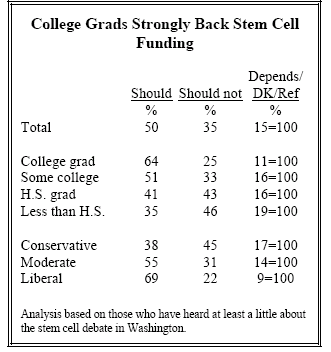
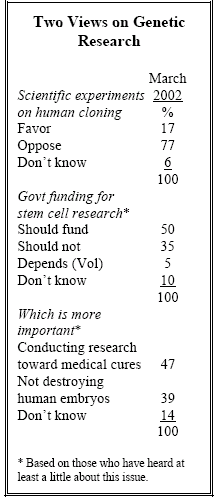
Although I feel that the education of the public could be a great help to the support of stem cell research, I also feel that there are many groups that will not change their minds because of their ethical and moral objections to embryonic stem cell research.
The same study cited above also considered the role of religion in the support of stem cell research. Below are some of their findings on the role of religion in opposing research.
"Religious commitment is
the most
important factor influencing attitudes of opponents
of stem cell research. While white evangelical
Protestants stand out as the group most opposed to
federal funding for stem cell research, this
opposition is largely limited to highly-committed
white evangelical Protestants, who oppose
federally-funded stem cell research by three-to-one
(58%-19%).1"
"37% of
those who think the
government should not fund stem cell research cite
religious beliefs as their biggest influence. This is
particularly the case among white evangelical
Protestants, fully 55% of whom explain their
opposition to stem cell research in terms of their
religious beliefs. Just 31% and 27% of white mainline
Protestants and white Catholics, respectively, cite
religious beliefs in explaining their opposition to stem
cell funding."
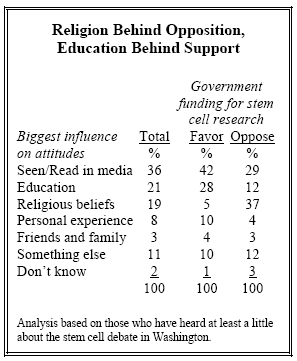
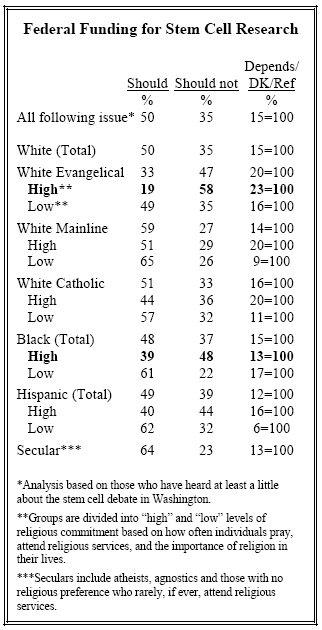
While the religious population is opposed to stem cell research, they are also unwilling to waver in their opinion, whereas those in favor are more likely to be more "on the fence" about the issue.
Even though I feel that the education of the public on the issue would be a strength to the acceptance of stem cell research, I think it is unlikely to change the minds of those who are religiously devoted.
The study from the Pew Research Center seems to agree with my opinions.
"Unmovable
Opposition
Though almost evenly divided overall,
there is a significant disparity in how firmly
Americans favor or oppose stem cell research.
Overall, 43% say that conducting stem cell
research that might result in new medical cures is
more important than protecting human embryos
involved with this research. However, nearly half
(46%) of those who feel this way also say they
can imagine themselves placing a higher priority
on not destroying the potential life of human
embryos.
Among the 38% who already believe that protecting the potential life of
human embryos is
more important than medical research on stem cells, fully two-thirds say
they cannot imagine
changing their minds on this issue, and just 23% say they could see
themselves ever thinking that
discovering medical cures from stem cell research is more important."
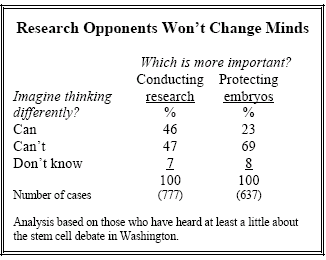
To see the full study from the Pew Research Center and the criteria of the survey conducted, click here.
In conclusion, I see the education of the public on the stem cell issue as a step in the right direction. No matter what people's opinions are on the issue after they have been informed, an educated opinion is infinitely more valid than one derived from other means. So, whether you are against or for stem cell research, at least your opinion is based on your accurate knowledge of the issue.
This website was created by a student for a Monmouth College course